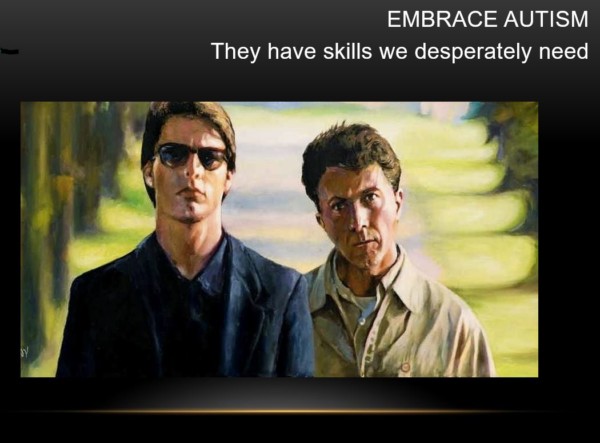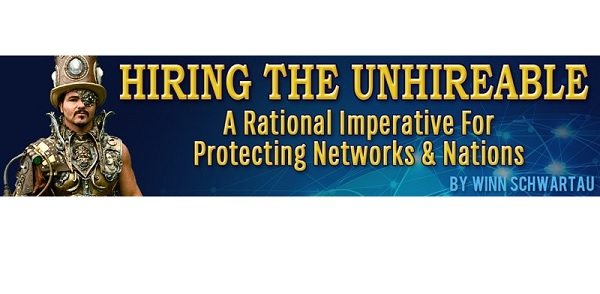Part 7 of 16
If you could look at a bowl full of M&Ms and in a matter of seconds know exactly how many are there waiting to be eaten… well that would be something. Or, if you could look at a table covered in coins and know, almost intuitively, exactly how much money sat there, that would be something, eh? And of course, what about a dropped box of toothpicks? Can you count all 2,246 instantly when you glance at them on the floor?
Or, how about if you could scan 100,000 lines of code and find the errant ‘<’ or ‘;’ – or ‘if’ vs ‘iff’ or error in:
strcpy(data.fname,f);
strcpy(data.mname,m);
slrcpy(data,lname,l);
strcpy(data.address,ad);
That would really be something (Can you see it?). Now, let’s say such a code-maestro applies for a job, but that person only speaks monosyllabically, never looks you in the eyes, is constantly fidgeting and dresses with a misfit combination of stripes, plaids and paisley… with his shirt tail poking out of his pants zipper.
I have only seen two companies with HR signs that scream, “Autistic? We want you!” but hey everyone else, damn, those skills! Get ‘em sooner than later!
Our industry needs to embrace autism for the skills special people offer. Rain Man style autism.

We have a large global community of people with these characteristics who also happen to love technology. They are all too often excluded, not only because of education, check-box certifications, but because of social awkwardness and their current preconceived inability (read, HR-fail and unwillingness) to fit them into our system. We’re missing a huge opportunity to find more people and embrace the very characteristics and talents that will make them great for our industry.
It’s now called “under the spectrum” stuff; Asperger’s, ADHD; OCD, there’s really a whole spectrum of ‘not normal’ stuff. (Again, not a binary condition. Spectrum, people. It’s analogue!)
I truly believe there is no such thing as normal. Are any of us normal? No, we wouldn’t be in cybersecurity if we were. But, on that Bell curve distribution spectrum of ‘afflications’, current biases and discriminatory practices make their unique skills ‘Unhireable’. On either side of that middle 68 percent. Sheesh.
One of the geeks that works for a company whose board I sit on — is a complete full blown autistic; but damn can he code! Sees stuff no one else can see and makes it work when the conventional wisdom is, “It can’t be done.” BS. Sure it can. I see it every day.
How does HR, how does a typical organization deal with folks ‘on the spectrum’?
Right now we usually just respond, “You can’t work here. You’re hair’s too long, you don’t look like Ross Perot. You’re color blind. And, oh, by the way, you’re also autistic? Even though your skill sets are incredible. We can’t hire you.”
If the HR person cannot interact in ‘normal’ ways with such people, their tendency is to exclude. One woman filed a lawsuit against a major retailer because the HR folks rejected her for failing a ‘personality’ test? On the spectrum, folks are indeed, different – many won’t pass, and some will refuse to take such tests. Vive la Difference.
Some of the greatest minds in history sat at various levels on the spectrum. Nikola Tesla, one of my heroes, had an obsession with the number three—completely somewhere between autistic and Asperger’s because of his obsessions and his craziness. Edison—the same sort of thing.
It’s a genetic issue, so, if I can’t discriminate against people with a medical condition, say baldness, what about Autism, what about Asperger‘s? Is it okay to discriminate against them too? What about color blind? Again this is a discriminatory issue where you have skill sets sitting out there that we’re ignoring because they don’t fit neatly inside today’s box.
Companies need to give them a good work environment that is comfortable. Football stadium sized cubical farms won’t always work – depending on each person. Who does this really well? A few startup and forward thinking companies do it well. Not the government. Not big corporations.
We need to provide support systems and embrace the people – first – so we can all benefit from their incredible and desperately-needed skills.
Part 6: You’re not so special (Really, you’re not)
Part 8: Let’s profile ’em all!
Winn Schwartau is the CEO of The Security Awareness Company, the author of Information Warfare, Pearl Harbor Dot Com (Die Hard IV), and the upcoming Analogue Network Security.
- Why Data Security Is the Real AI Risk - June 30, 2025
- Why Being Bold Matters in Cybersecurity—and Branding - June 3, 2025
- Gear Tested and Approved: My Top Picks for Dads and Grads This Season - May 28, 2025



